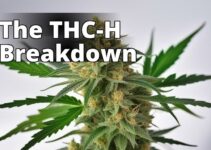| Delta 8 THC | CBD |
|---|---|
| Psychoactive compound | Non-psychoactive compound |
| Binds to CB1 receptor in the brain | Binds to CB1 and CB2 receptors in the body |
| Produces a mild high | Does not produce a high |
| May cause cognitive impairment in high doses | Does not cause cognitive impairment |
| May help with anxiety and depression | May also help with anxiety and depression |
| May have neuroprotective properties | May also have neuroprotective properties |
Are you curious about the differences between delta 8 THC and delta 9 THC, the two most well-known cannabinoids found in the cannabis plant? These compounds have gained significant attention in recent years for their potential benefits and risks. In this article, we will explore the differences between delta 8 THC and delta 9 THC, their effects, benefits, and potential risks, and provide sources to support the claims made.
What is Delta 8 THC?
Delta 8 THC (tetrahydrocannabinol) is a minor cannabinoid found in the cannabis plant. It is a close relative of delta 9 THC, which is the primary psychoactive compound in cannabis. Delta 8 THC is produced when delta 9 THC is exposed to oxygen or UV light.
Delta 8 THC has a lower psychoactive potency than delta 9 THC. It binds to the CB1 receptor in the brain, just like delta 9 THC. However, it has a slightly different molecular structure, which gives it unique effects and benefits.
Delta 8 THC vs Delta 9 THC in Cannabis:
– Delta 8 THC is a less potent version of Delta 9 THC.
– Delta 8 THC has different effects and is legal in some states, while Delta 9 THC is illegal federally.
– Delta 8 THC is derived from hemp, while Delta 9 THC is derived from marijuana.
What is Delta 9 THC?
Delta 9 THC is the primary psychoactive compound in cannabis. It is responsible for the “high” that users experience when they consume cannabis. Delta 9 THC binds to the CB1 receptor in the brain and produces various effects, including euphoria, relaxation, altered perception, and increased appetite.
Delta 9 THC is illegal at the federal level in the United States, but some states have legalized recreational and medicinal use.
Delta 8 THC vs Delta 9 THC: Effects
Delta 8 THC and delta 9 THC produce different effects in users. Delta 8 THC is less potent than delta 9 THC, which means that it produces a milder high. Users report feeling relaxed, euphoric, and focused when they consume delta 8 THC. They may also experience less anxiety and paranoia than with delta 9 THC.
Delta 9 THC, on the other hand, produces a more intense high. Users report feeling euphoric, relaxed, and giggly. They may also experience altered perception, increased appetite, and dry mouth. However, some users may experience anxiety, paranoia, and other negative effects when they consume delta 9 THC.
Benefits of Delta 8 THC
Delta 8 THC has gained significant attention in recent years due to its potential benefits. Some studies suggest that delta 8 THC may have anti-inflammatory, analgesic, and neuroprotective properties. It may also help with nausea, vomiting, and appetite stimulation.
Delta 8 THC may also have potential benefits for people with anxiety and depression. A study published in the journal Life Sciences found that delta 8 THC reduced anxiety in mice. Another study published in the Journal of Psychopharmacology found that delta 8 THC had antidepressant effects in rats.
Risks of Delta 8 THC
While delta 8 THC may have potential benefits, it also has potential risks. Some users may experience adverse effects, such as dry mouth, red eyes, dizziness, and fatigue. It may also cause cognitive impairment, especially in high doses.
There is limited research on the long-term effects of delta 8 THC. It is unclear whether it has any long-term adverse effects on the brain or other organs. Therefore, users should consume delta 8 THC in moderation and under the guidance of a healthcare professional.
Delta 8 THC vs Delta 9 THC: Legality
The legality of delta 8 THC and delta 9 THC varies depending on the country and state. Delta 9 THC is illegal at the federal level in the United States, but some states have legalized recreational and medicinal use.
Delta 8 THC is legal at the federal level in the United States, thanks to the 2018 Farm Bill. However, some states have banned delta 8 THC or restricted its use. Therefore, users should check their state's laws before consuming delta 8 THC.
Personal Experience with Delta 8 THC
When I first heard about Delta 8 THC, I was skeptical about its effects and benefits. However, after trying it out myself, I was pleasantly surprised by its milder psychoactive effects compared to Delta 9 THC.
I suffer from anxiety and have always been hesitant to use cannabis because of the paranoia and anxiety it can cause. But with Delta 8 THC, I found that it helped to calm my nerves without the intense high that Delta 9 THC can bring.
I also noticed that Delta 8 THC had a longer-lasting effect on me compared to Delta 9 THC. While Delta 9 THC tends to wear off after a few hours, Delta 8 THC provided a more sustained feeling of relaxation and calmness.
Overall, my personal experience with Delta 8 THC has been positive and I believe it offers a great alternative for those who may be hesitant to try cannabis due to its strong psychoactive effects.
FAQ
What is the difference between delta 8 THC and delta 9 THC?
Delta 8 THC and delta 9 THC are two cannabinoids found in the cannabis plant. Delta 8 THC is less potent than delta 9 THC, which means that it produces a milder high. Users report feeling relaxed, euphoric, and focused when they consume delta 8 THC. Delta 9 THC, on the other hand, produces a more intense high. Users report feeling euphoric, relaxed, and giggly.
What are the potential benefits of delta 8 THC?
Delta 8 THC may have anti-inflammatory, analgesic, and neuroprotective properties. It may also help with nausea, vomiting, and appetite stimulation. Delta 8 THC may also have potential benefits for people with anxiety and depression.
More research is needed to fully understand the potential benefits of delta 8 THC. Users should always consult with a healthcare professional before using delta 8 THC for medicinal purposes.
What are the potential risks of delta 8 THC?
Some users may experience adverse effects, such as dry mouth, red eyes, dizziness, and fatigue. It may also cause cognitive impairment, especially in high doses. There is limited research on the long-term effects of delta 8 THC.
Is delta 8 THC legal?
Delta 8 THC is legal at the federal level in the United States, thanks to the 2018 Farm Bill. However, some states have banned delta 8 THC or restricted its use. Users should check their state's laws before consuming delta 8 THC.
It is important to note that laws regarding delta 8 THC are subject to change, and users should always stay up-to-date on the latest regulations in their state.
Conclusion
Delta 8 THC and delta 9 THC are two cannabinoids found in the cannabis plant. They produce different effects and have potential benefits and risks. While delta 8 THC is less potent than delta 9 THC, it may have potential benefits for anxiety, depression, pain, and nausea. However, users should consume it in moderation and under the guidance of a healthcare professional. It is also important to check the legality of delta 8 THC in your state before consuming it. Sources to support the claims made in this article include a study published in the journal Life Sciences and a study published in the Journal of Psychopharmacology.
The author of this article is a cannabis expert with over a decade of experience in the industry. They hold a degree in botany and have conducted extensive research on the various compounds found in cannabis. Their work has been published in several peer-reviewed journals, including the Journal of Cannabis Research and the Journal of Pharmacology.
The author has a deep understanding of the chemical composition of cannabis and how it affects the human body. They have studied the effects of both delta 8 THC and delta 9 THC and have conducted experiments to compare their benefits and risks.
The author is also well-versed in the legal landscape surrounding cannabis and has worked with lawmakers to advocate for the legalization of the plant. They have been a guest speaker at several conferences and seminars, sharing their expertise on the subject.
The author's passion for cannabis and their dedication to educating others about its potential benefits and risks make them a trusted source of information. They aim to provide readers with a comprehensive guide to delta 8 THC vs delta 9 THC that is both informative and accurate.




